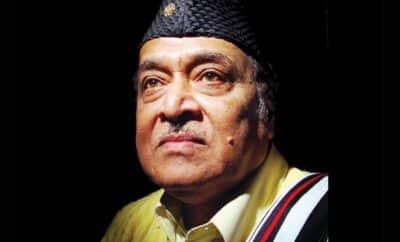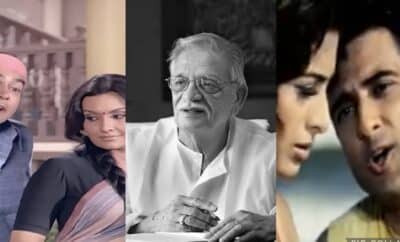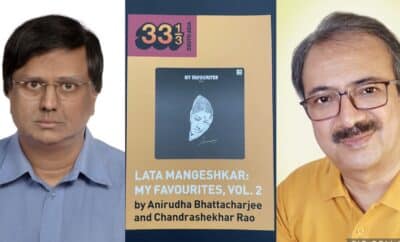Collections
Anil Biswas and Talat Mahmood – The Deeply Dulcet Combination
Anil Biswas was one of the few veteran music directors, who started their career in Hindi cinema prior to the commencement of the payback era, but continued with their prominence even during the payback / golden era. Rightly known as Bheeshma Pitamaha or the patriarch of Hindi film music, he, apart from being one of the pioneers of playback singing, is also credited with introduction of orchestral music, choral effects and counter melody in the film scores. He was also known for the use of Indian classical and folk elements in his songs. His music was thus a beautiful blend of the east and the west.
In his career of over 3 decades, Anil Biswas composed music for 90 odd films; and many of his songs are cherished by the music lovers to date. During his career, particularly in the 1940s, he picked and groomed many singers like Lata Mangeshkar and Mukesh, who soon went on to rule the arena of playback singing in Hindi cinema. He is considered as one of the founders of the Lata era, alongside Ghulam Haider and Khemchand Prakash.
Anil Biswas’s another noteworthy mentee was Talat Mahmood – the playback singer who had a silky voice with a unique tremolo. Talat Mahmood had started his career long before his alliance with Anil Biswas. The non-film song “Sab din ek samaan nahin” marked his singing debut in 1941. Thereafter, he worked as an actor-singer in a few films in Kolkata and came to Mumbai in 1949 to sing for Hindi films with immense popularity of his non-film song “Tasveer teri dil mera behla na sakegi” as the viaticum. He got a big break with the song “Aye dil mujhe aisi jagah le chal (Arzoo – 1950)” sung for Anil Biswas. Though due to the peculiar texture of his voice, he could never make it to the league of the always-in-demand versatile playback singers like Mohammed Rafi and Kishore Kumar; he always remained the playback singer of choice of many music directors for soulful and romantic songs due to this very quality. He also sang numerous non-film songs, mainly under the genre of Ghazal. Besides, he also recorded songs in many other Indian languages. He also acted in a few films, but couldn’t leave his mark as an actor in Hindi cinema in spite of his handsomeness and good personality. Nonetheless, he will always be remembered as the most handsome playback singer of those times.
Soon after he kicked off his career as playback singer, some gossip mongers started spreading rumours about difficulty in recording his songs due to the tremolo in his voice and music directors started avoiding him. Though Anil Biswas and a few music directors like C. Ramchandra, S.D. Burman, Shankar Jaikishan and Madan Mohan still continued to confide in him, his popularity went into a rapid descent. His career came to an end in the early 1970s, leaving a sour taste in this thorough gentleman’s mouth forever. To quote Talat Mahmood, “Call the dog mad and then shoot it – this is the approach followed by the people in in the film industry, if they want to destroy someone’s career.”
Anil Biswas not only gave Talat Mahmood his first big break, but also always tried to boost his confidence that he tended to lose due to the rumours about his voice. Though they worked together on as few as less than 20 songs, they shared such a bond that if Talat Mahmood is mentioned, Anil Biswas immediately comes to mind. Talat Mahmood always held Anil Biswas in utmost reverence due to his mentorship and confidence-boosting. Talat Mahmood acknowledged Anil Biswas as the music director he liked the most and is reported to have said that it was always difficult for him to control the temptation of including all the Anil Biswas songs in the list of his own favourite songs.
Let us enjoy the fantastic solos that protégé rendered under the mentor’s baton.
1. Aye Dil Mujhe Aisi Jagah Le Chal (Arzoo – 1950)
When Talat Mahmood came to Mumbai to try his luck with Hindi cinema, the popularity of his non-film song “Tasveer teri dil mera behla na sakegi” had already preceded him. Anil Biswas therefore sent for him soon after his arrival. Awed that he was by Anil Biswas’s stature, Talat Mahmood kept on procrastinating going to Anil Biswas. However, after the third message from Anil Biswas, Talat went to see him like a freshly qualified candidate going for his first interview. As soon he reached the recording studio, Anil Biswas scolded him left, right and centre and asked him to start the recording. Talat Mahmood’s confidence was completely shattered and he couldn’t sing properly in spite of several takes. When embarrassed Talat came out of the recording room, Anil Biswas comforted him saying that he knew he was a good singer, but was nervous; and asked him to visit the studio for recording after a few days. Talat Mahmood went to the studio after two weeks and the song was recorded in just one take! The song became very popular and announced Talat Mahmood’s arrival on the landscape of Hindi cinema.
The song was “Aye dil mujhe aisi jagah le chal” for the film Arzoo (1950), picturised on the desolate hero (Dilip Kumar) lamenting his heart-break. The nuanced and heart wrenching tune is composed by Anil Biswas in raag Darbari and the pathos in the tune is enhanced by the use of violins in the interludes and well-supporting words of Majrooh Sultanpuri. The brief strums of guitar in the prelude followed by a piece of violins perfectly set the tone of the mood.
From this song onwards, Talat Mahmood became the voice of Dilip Kumar for a short stint, until he was replaced by Rafi.
2. Ek Main Hoon, Ek Meri Bekasi Ki Shaam Hai (Tarana – 1951)
The soundtrack of Tarana (1951) was a masterstroke by Anil Biswas with 6 melodious solos by Lata Mangeshkar, 2 wonderful Talat Mahmood – Lata Mangeshkar duets and a sad solo by Talat Mahmood.
The Talat solo, “Ek main hoon, ek meri bekasi ke shaam hai” (a poignant song picturised on the heartbroken hero, again, Dilip Kumar), is yet another quintessential song of the Anil Biswas – Talat Mahmood combo. The tune drenched in poignancy is supported by use of violins and Talat’s soulful rendition. The lyrics are penned by Kaif Irani.
Other remarkable songs from the album are the splendid Talat – Lata duets “Seene mein sulagte hain armaan” and “Nain mile, nain hue baawre” and the Lata solos – “Beimaan tore nainwa” and “Mose rooth gayo mora saawariya”.
3. Shukriya, Shukriya, Aye Pyar Tera Shukriya (Aaram – 1951)
The derogatory comments about the tremolo in his voice by some wicked souls had made Talat Mahmood conscious; and he had started looking upon it as a defect. Talat Mahmood was recording a song for Anil Biswas, who was not satisfied with Talat’s rendition eve after a couple of takes. Anil Biswas asked him with agitation what was wrong with him. “Nothing, dada”, said Talat. Anil Biswas then asked him why he was not properly singing. Looking at perplexed Talat, Anil Biswas furthered his question, “Where is the tremolo in your voice?” Talat sheepishly replied, “Dada, people say that it’s a defect in my voice”. Furious Anil Biswas said, “Let them go to the dogs! The tremolo is Talat Mahmood’s identity. What unique remains in your voice if it goes away?” And then Talat Mahmood rendered the song to the satisfaction of Anil Biswas.
The song was “Shukriya, shukriya, aye pyar tera shukriya” from Dev Anand – Madhubala starrer film Aaram (1951). The song is a sarcastic thanks-giving to love that brings along many a nuisance. The sarcasm is very effectively portrayed by the lyricist Rajinder Kirshan through his words. Anil Biswas has woven the words in a velvety tune rendered by Talat Mahmood very softly. The song is picturised on Talat Mahmood himself in a special appearance, seen as singing the song in a party thrown by the hero Dev Anand.
A couple of interesting facts about the soundtrack of this film is that it has no duets and the hero Dev Anand lip syncs none of the 3 male solos in it.
4. Muhabbat Tark Kee Maine (Do Raaha – 1952)
This is a melancholic song from Do Raaha (1952) starring Shekhar and Nalini Jaywant in the lead roles. The song paints in deep blue the feeling of desolation through Anil Biswas’s touching tune, Talat Mahmood’s stirring rendition and Sahir Ludhianvi’s prolific words.
This song was one of Talat Mahmood’s personal favourites.
The film has two more melodious solos by Talat – “Tera khayal dil se mitaya nahin abhi”, another sad song; and “Dil mein basa ke, meet bana ke”, a romantic song.
5. Kabhi Hain Gham, Kabhi Khushiyaan (Waris – 1954)
Waris (1954) starred Talat Mahmood himself in the lead role, opposite Suraiya. “Kabhi hai gham, kabhi khushiyan” is kind of a philosophical song, through which the hero is trying to pacify the distressed heroine by explaining that joys and sorrows are two sides of the same coin and they keep on rotating.
The composition is adorned by Anil Biswas with violins and sitar; and the gentleman has rendered this gentle composition pleasantly in his feather-soft voice. The lyrics are penned by Qamar Jalalabadi.
The film also had a stupendous 3-version song “Rahi matwale”, rendered by both Talat Mahmood and Suraiya.
6. Jeevan Hai Madhuabn (Jasoos – 1957)
Anil Biswas and Talat Mahmood seem to have worked together after a long time for this film, after Waris (1954). The film had an Asha-dominated soundtrack, with only one song by Talat Mahmood – “Jeevan hai madhuban”. Though the audio of the song is available on the internet and the song finds a mention in almost all the discussions on Anil Biswas – Talat Mahmood songs on various online forums, little information is available on the internet about this film. According to some accounts, this film was never released.
The lyrics penned by Indeevar are quite philosophical and motivational inspiring positivity in life. Talat Mahmood sounds very soft and silken, as usual. It appears as though he has rendered the song with a subtle smile on his face throughout. Anil Biswas has composed a mesmerising tune with a little slow pace and adorned it with the notes of piano and pieces of violins optimally, leaving sufficient scope for the singer. Anil Biswas was inspired by “Que sera sera” sung by Doris Day in Alfred Hitchcock’s The Man Who Knew Too Much (1956). However, with his Midas touch, he has created an such outstanding composition that it seems completely original.
This was the last song of Anil Biswas and Talat Mahmod together, though they continued to work independently for Hindi cinema for a few years thereafter, albeit at a descending pace.
Non-film songs
Talat Mahmood also sang a couple of non-film songs under Anil Biswas’s baton – “Phir pyar kiya, phir roya” (a Ghazal) and “Sitaron tum gawah rahna”.
https://www.youtube.com/watch?v=X4AeFXBtbJA
Apart from all the solos and duets discussed above, Talat Mahmood sang two more duets with Suraiya for Waris (1954) and a duet with Lata Mangeshkar for Jallianwala Bagh Ki Jyoti (1953) for Anil Biswas. This Talat – Lata duet is a lilting composition with astounding Anil Biswas touches.
Though the work of Anil Biswas – Talat Mahmood combination is pretty less in quantitative terms, it is quite rich in quality and will be treasured by the music lovers in their hearts eternally. We can only wish their short-lived alliance had lived a little longer.




Sheetal Garg
July 7, 2020 at 10:14 am
Very detailed andvwell written ??
Unfortunate, how, malicious rumours ruined a great artists’ career… But he remains a favourite of his fans.. I also knew him for his ghazals… But the article so beautifully chalks out his journey… Personally.. I love the tremolo in his voice ??
Yogesh
July 10, 2020 at 12:21 pm
Thanks Sheetal, I am glad that you liked it
Pingback: Carnival of Blogs on Golden Era of Hindi Film Music – July 2020 – The world is too small? or Is it?
Virender Gupta
July 7, 2023 at 11:30 am
Very well researched and beautifully summarised ??????
Madhupati Sharma
July 7, 2024 at 9:16 pm
Anil Biswas was so fond of him that in SAREGAMA programme on TV, he came with a photo of Talat Mehmood. The best of Talat Mehmood are credited to him and next Madan Mohan. Although some exceptionally good are with every MD of those sunny days of Talat.
You write so fluently, it is factual,lyrical and a pleasure to go through.
Madhupati Sharma
July 7, 2024 at 9:18 pm
Rahi Matwale.. may be a good invlusion.